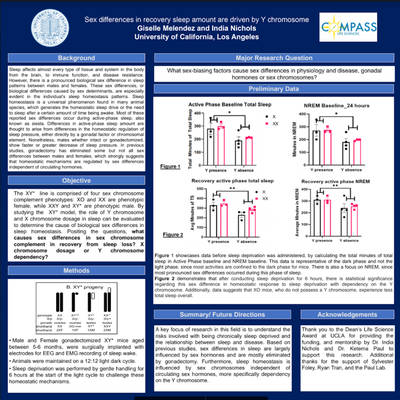
Giselle Melendez
Home Institution: UCLA
UCLA Mentor: Dr. Ketema Paul
Program: Deans Award
Abstract:
In a society that glorifies excessive productivity, insufficient sleep has paved a detrimental impact on public health. Multiple studies highlight discrepancies in daily sleep and wake patterns between men and women, yet there is vague evidence outlining how biological sex directly affects sleep regulatory processes. Previous studies determined that sex differences in recovery sleep amount are partially dependent on sex chromosomes. To examine spontaneous sleep states and the ability to recover from sleep loss, polysomnographic sleep recordings were obtained from gonadectomized (GDX) FCG mice. Whereas the presence of the Sry gene accounts for most sex differences during spontaneous sleep, recovery from sleep loss demonstrated sex differences in sleep amount partially driven by sex chromosome complement. The XY* mouse model enables investigation of these sex chromosome discrepancies generated by varying genetic dosages of the X or Y sex chromosomes. The XY* line is comprised of four sex chromosome complement phenotypes: XO and XX are phenotypic female, XXY and XY* are phenotypic male. Adult mice were implanted with four stainless steel electroencephalograph (EEG) and electromyography (EMG) recording electrodes. Mice were subjected to 24 hrs of baseline (spontaneous) sleep-wake recording. Following baseline, mice were subjected to six hrs of sleep deprivation by gentle handling and allowed to recover during the remainder of the 24-hr recording period. XY* mice had more sleep than XO mice (p=0.030) and slightly more sleep than XX mice (p=.051). These results postulate that genetic factors on the sex chromosomes encode varying homeostatic responses to sleep loss.

